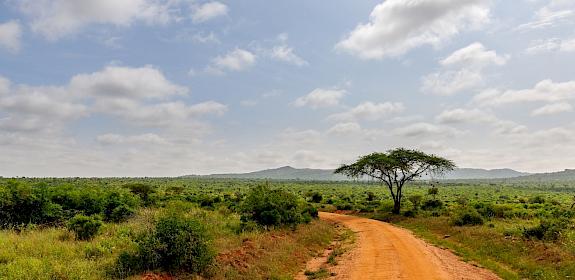Chinese timber industry representatives visit Cameroon
Yaoundé, Cameroon: December 2017—representatives from the timber industry in China visited Cameroon last week to see for themselves where timber imports are sourced and to meet those involved in the trade chain.
The industry exchange visit was organised by TRAFFIC and IUCN in close collaboration with the China Timber & Wood Products Distribution Association (CTWPDA), the Ministry of Forestry and Wildlife (MINFOF) and the traditional rulers’ network managing community forests (French acronym ReCTrad).
The exchange took place aiming to promote legal timber sourcing under a “Reinforcing Chinese government and industry action to reduce illegal timber in supply chains originating from Cameroon” project funded by the UK Department for International Development (DFID) (now FCDO).
China is the world’s largest importer of timber and a key consumer, processor and re-exporter of timber products, increasingly from Africa. In 2011, China imported 42.32 million cubic meters of round wood and 21.51 million cubic meters of sawn wood from Africa, accounting for nearly 25% of the world’s log and sawn wood export. China is also the main country importing timber from Cameroon.
In Cameroon, efforts to improve forest governance have been heavily influenced by the establishment of Voluntary Partnership Agreements (VPAs), under the EU Forest Law Enforcement, Governance and Trade (VPA-FLEGT) process, which has resulted in the development of a Timber Legality Assurance System (TLAS) for forest exploitation and trade.
The VPA legality definition plays a strong role in ensuring legality compliance for timber exports and re-exports from Cameroon to markets in China.
During the exchange, delegates met Mr Nyongwen Joseph, Secretary General of MINFOF, who spoke of Cameroon’s 2035 vision of creating incentives for sustainable businesses.
The mission met Civil Society Organizations to share information from the Chinese timber industry sector and learn about the problems and challenges local communities face relating to poor road infrastructure, social needs of communities, the relationship with industries, and the low productivity of community forests. Delegates also visited Kribi Seaport, to see the clear business opportunities that exist there, as a potential exit point for timber from community forests in Melombo in southern Cameroon.
“China needs timber and the demand is growing daily,” said Mr Li Jianfeng, CTWPDA’s Secretary General. “It was necessary for us to visit Cameroon to immerse ourselves in the realities and opportunities offered by your country in this sector. The forests are vast and legally harvesting them will not only enrich local residents but also help solve the timber supply problem in China.”






